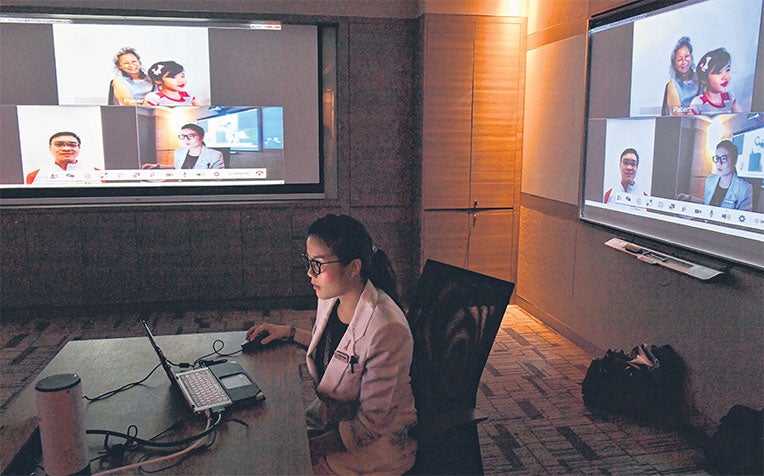
conducting a video consultation with a mock patient at home with her caregiver and the patient’s “father” yesterday.
A few months after her son’s birth, administrative worker Liu Xin realised that he had a bad case of eczema – a skin condition which causes itchiness.
She took him to KK Women’s and Children’s Hospital (KKH), where doctors asked if she preferred that the next consultation be done through video call via a smartphone or computer. She said yes. “It would have caused us some trouble to take the baby to the hospital,”
Ms Liu, who is in her 20s, told reporters yesterday, giving the thumbs up to telemedicine. Her six-month-old baby is one of the first patients to use the new video call system, which is being rolled out nationwide, starting with six public healthcare institutions, including KKH.
Dr Mark Koh, who heads the hospital’s dermatology service, said he sees around 200 eczema patients a week, 40 of whom would be suitable for video consultations with pharmacists, who check on a patient’s skin and make sure the medication is suitable. “It replaces a follow-up appointment with the doctor and saves an extra visit, especially if the eczema is well controlled,” he said.
Pharmacists will help arrange for a face-to-face appointment with a doctor if they decide that the child needs one, he added.
Depending on the hospital, patients may pay for the video consultations upfront after their first face-to-face doctor’s visit, and the costs could be lower than seeing a doctor face-to-face.
Mr Bruce Liang, who is chief executive of Integrated Health Information Systems and chief information officer at the Health Ministry, said that they will be monitoring patient feedback on these virtual consultations to make sure patients are comfortable with the technology.
Some, like housewife Catherine Ng, 59, have reservations. “An online consultation just won’t have a human touch. In face-to-face consultations, the doctor and patient can communicate better,” she said.
However, 19-year-old Lee Xin Min has no qualms about using video call technology for medical consultations, as long as the quality of care remains the same.
Said the student: “Telemedicine sounds incredibly convenient... I can arrange my time around the consultation and return immediately to what I was doing before.”
Telemedicine is not a novel concept. Seven years ago, Khoo Teck Puat Hospital started a similar scheme with eight nursing homes. But in that case, a special video conferencing set was used as the technology on smartphones was not so readily available.
The success of the scheme was limited by the need for specialised hardware, said Dr James Low, a senior consultant in the hospital’s geriatric medicine department. “Cabling in our hospital and the nursing homes was required when we started,” he said.
But even with the constraints, he added, it helped save nursing home residents and their caregivers a trip to hospital.
Contributed by














 Get it on Google Play
Get it on Google Play